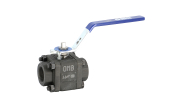Local Storage seems to be disabled in your browser.
For the best experience on our site, be sure to turn on Local Storage in your browser.

Ball valves
Manufacturing stages of a forged steel-body valve
Making a forged ball valve is a two-stage process:
1. Forging
A heavy-duty forged steel ball valve is made up from a carbon steel or stainless-steel bar. This bar is then forged, i.e. it is shaped using a hammering device (hammer) and a stand (die), in order to get the desired size and aspect. This can be done with three different techniques: hot forging, warm forging, or cold forging. Forging is a great way to prevent the formation of defects (porous elements) inside the valve parts. The process also helps position the metal fibres in order to create robust parts and reinforce their mechanical strength.
2. Bar turning / mechanical machining for threading and internal parts
The valve then goes through bar turning or mechanical machining. This technique involves sharpening the part by removing material (shavings). This is done using a cutting tool and a rotation process. Bar turning also facilitates the automatic production of a series of very precise parts, thanks to a cam system or digitally controlled operations.
Forged ball valves: applications
Forged ball valves are used in multiple industrial fields, such as the chemical and pharmaceutical industries, in refineries and in the petrochemical sector, but also in water and compressed air systems.
They suit high pressure and high temperature applications.
Syveco’s offer
Syveco offers a wide selection of two-piece forged steel-body valves, divided into two different pressure rating classes: 800 lbs and 1500 lbs.
Class 800 lbs valves have a PTFE and carbon graphite seat, while class 1500 lbs seats are in PEEK, tolerating temperatures of up to 205 °C (against 180 °C for PTFE + graphite seats).
Our valves also share the following specificities:
- Anti-blowout stem,
- Full bore,
- Antistatic device.
Good to know: BW and SW references are all fitted with 100 mm length welding ends. They prevent seats to be damaged while the welding is done.
Last, our high-pressure forged ball valves also have two very important certifications: fire safe according to BS 6755 (for 800 lbs only) and NACE MR01-75 (anti-corrosion standard).

